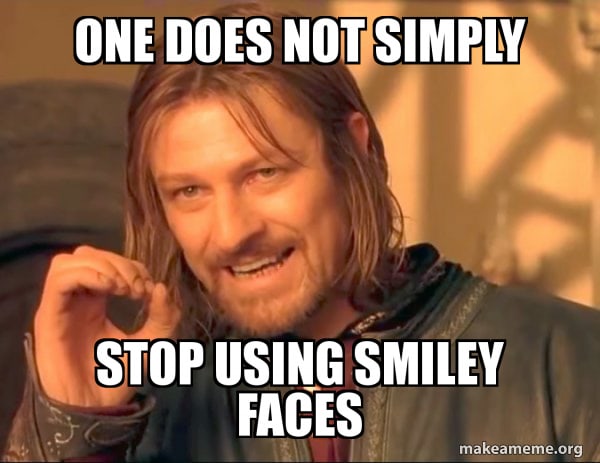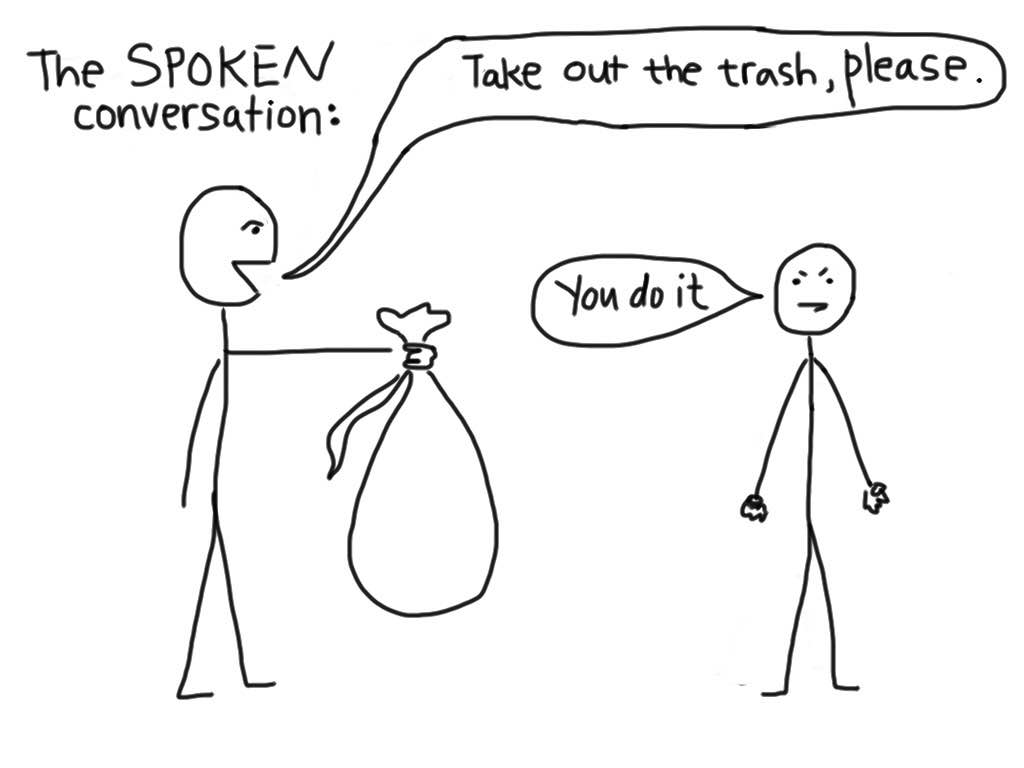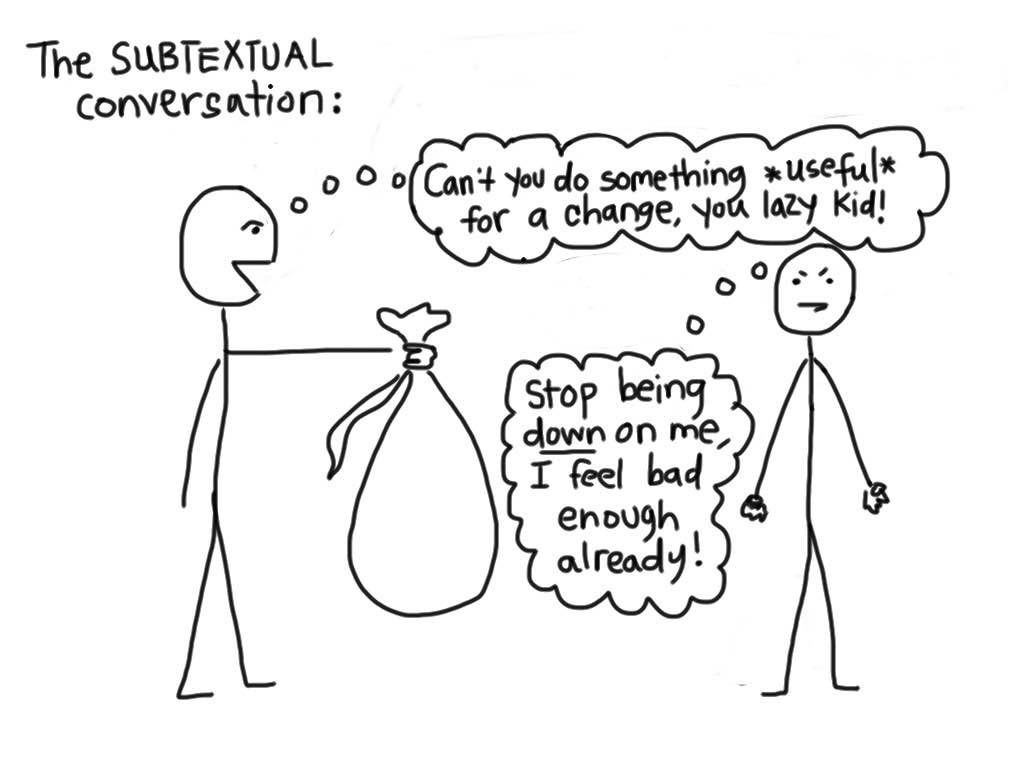Bayes' theorem, plausible deniability, and smiley faces
post by Adam Zerner (adamzerner) · 2021-04-11T20:41:10.324Z · LW · GW · 9 commentsContents
9 comments
I believe they refer to that as a, smiley face. They're frequently used by idiots at the end of emails and text messages.
I have a dilemma. I live in an era of text messaging, Slack, and internet forums. Sometimes I'll be in a conversation where I and my conversational partner end up using smiley faces a lot. But, like Larry David, I find that they can get annoying.
"So? Just stop using them then." you may be thinking. If only it were that simple.
You see, once I have already established this as a normal response:
- That's awesome, thanks :)))
- You're the best! :)
- Woo hoo :)
If I then respond with just "thanks", well, it seems like something is wrong. I've established this pattern of emphatic thank yous as a baseline, and now I'm going way below that baseline, so I must be ticked off or something.
Why would that be? There are various ways to think about it. Let's start off with denotation vs connotation. Denotation is about the literal meaning of the word. Connotation is more... "catch my drift?". The denotation of me saying "thanks" − the literal meaning of it − is, well, an expression of me being thankful. But the connotation can vary drastically depending on the context. And if we're in a context where I usually give responses such as "That's awesome, thanks :)))", the connotation of a measley "thanks" is that I'm upset.
Or maybe a better way to frame it is as text vs subtext.
Those both work. But I think a more fun way to frame it is in terms of bayesian evidence.
"What on Earth do I have to do to convince you? "
"To convince me that you harbor no ambitions of becoming a Dark Lord?" said Professor Quirrell, now looking outright amused. "I suppose you could just raise your right hand."
"What?" Harry said blankly. "But I can raise my right hand whether or not I -" Harry stopped, feeling rather stupid.
"Indeed," said Professor Quirrell. "You can just as easily do it either way. There is nothing you can do to convince me because I would know that was exactly what you were trying to do. And if we are to be even more precise, then while I suppose it is barely possible that perfectly good people exist even though I have never met one, it is nonetheless improbable that someone would be beaten for fifteen minutes and then stand up and feel a great surge of kindly forgiveness for his attackers. On the other hand it is less improbable that a young child would imagine this as the role to play in order to convince his teacher and classmates that he is not the next Dark Lord. The import of an act lies not in what that act resembles on the surface, Mr. Potter, but in the states of mind which make that act more or less probable."
Harry blinked. He'd just had the dichotomy between the representativeness heuristic and the Bayesian definition of evidence explained to him by a wizard.
Let's unpack this a little bit. Using the representativeness heuristic, one would think that "thanks" means that the person is thankful. "thanks" is representative of a person who is thankful.
But that's a very surface-level way of looking at things. In order to look beneath the surface, you have to start thinking about "the states of mind which make that act more or less probable". You have to start applying Bayes' theorem.
Bayes' theorem basically says to think about this smiley face situation like this. "If everything was cool, how likely is it that Adam would avoid using a smiley face? Not very likely. He always uses smiley faces in these sorts of situations. Hm. And what about if he was pissed? Definitely more likely that he wouldn't use one in that situation. So this seems like it points towards him being pissed."
More generally, you have to look at worlds where your hypothesis is true, ask how likely it is you'd come across the evidence, then look at worlds where it's false, ask the same question, and then compare answers. That tells you how strong the evidence is.
This is a perfect segue into plausible deniability.
"Well," Harry said, as their shoes pattered across the tiles, "I can't just go around saying 'no' every time someone asks me about something I haven't done. I mean, suppose someone asks me, 'Harry, did you pull the prank with the invisible paint?' and I say 'No' and then they say 'Harry, do you know who messed with the Gryffindor Seeker's broomstick?' and I say 'I refuse to answer that question.' It's sort of a giveaway."
For Harry, if he says "I refuse to answer" regardless of whether or not he pulled the prank, when a teacher hears him say "I refuse to answer", it doesn't really point towards him being guilty. For smiley faces, if I avoid them regardless of whether or not I'm angry, it'd never point at me being angry.
The thing is though, for plausible deniability, it's hard to establish it after the fact. It's something you kinda have to plan ahead for.
Damn. Things are looking pretty bleak for my smiley face situation. I think I may have a way out of it though: prior probability.
Remember when we talked about bayesian evidence? Well, that was only one half of the story. The other half is prior probability. Here's how it works. You start off with a belief: your "prior". Then you observe some evidence that points in a particular direction. Then you update your belief. And your new belief is your "posterior".
There were some big words in there, but it's really not that bad. The big idea is that you have some starting point, and then you shift/update. Strong evidence means a big shift. Weak evidence means a small shift.
Anyway, I said that prior probability might be my out, so let me explain why. If I'm talking to a person who knows me well enough to know that I'm a nice person and a good communicator, their starting point would be that me saying "thanks" wouldn't imply passive-aggression. Sure, it is evidence of it. It points towards it. But since we're starting from a point of "it's highly unlikely Adam would be passive-aggressive", it'd only move them to a point of "it's pretty unlikely Adam is being passive-aggressive". Eg. maybe it'd move them from 0.1% to 0.5%.
PS: I'm not actually (that) neurotic about my smiley face usage. I just thought it'd be a fun way to talk about bayesian thinking :)
9 comments
Comments sorted by top scores.
comment by philh · 2021-04-15T23:02:58.128Z · LW(p) · GW(p)
Tangential, but Quirrel's line here has always seemed mistaken to me:
There is nothing you can do to convince me because I would know that was exactly what you were trying to do.
That's not how evidence works. If I'm trying to convince you that seven is prime, I can show you the proof, and that should convince you even if you know that's what I'm trying to do. If I'm trying to convince you that I can do a backflip, I can do a backflip, and that should convince you even if you know I'm trying to convince you. (I can't do a backflip.)
It's true that if you know I'm trying to convince you, some actions I can take will provide different weights of evidence to you, than if you didn't know that. Simply saying I can do a backflip will be less convincing if you know I'm trying to convince you that I can do a backflip, versus if you think my goal is "say a true fact about myself". And in context, there may indeed be nothing Harry can do to convince Quirrel that he's not an aspiring dark lord. But the general point seems untrue.
Replies from: adamzerner↑ comment by Adam Zerner (adamzerner) · 2021-04-16T00:02:05.848Z · LW(p) · GW(p)
Yeah I totally agree and have always thought that about the line as well. My steelman of it is that he means "nothing" in a more handwavy way, but it's still important to point out what you're saying I think.
Replies from: dreeves↑ comment by dreeves · 2021-04-19T16:49:06.769Z · LW(p) · GW(p)
Oh, Quirrell is referring to what game theorists call Cheap Talk. If the thing I'm trying to convince you of is strictly in my own brain -- like whether I intend to cooperate or defect in an upcoming Prisoner's Dilemma -- then any promises I make are, well, cheap talk. This is related to costly signals and strategic commitment, etc etc.
Anyway, I think that's the missing piece there. "Nothing you can do to convince me [about your own intentions] [using only words]".
comment by Yoav Ravid · 2021-04-12T19:16:48.856Z · LW(p) · GW(p)
This was a cute, fun little post. Thanks ;)
Replies from: adamzerner↑ comment by Adam Zerner (adamzerner) · 2021-04-12T19:31:24.798Z · LW(p) · GW(p)
Thanks! That's what it was intended as. I'm not sure how receptive the LW crowd is to posts like these, so it's good to get your data point here.
comment by dreeves · 2021-04-12T22:18:15.086Z · LW(p) · GW(p)
This is indeed a fun way to illustrate Bayesian thinking! But I have a monkey wrench! There exist people who view smileys as almost explicitly connoting passive-aggression or sarcasm. Like the whole reason to add a smiley is to soften something mean. I'm not quite sure if there are enough such people to worry about but I think that that perception of smileys is out there.
Replies from: adamzerner↑ comment by Adam Zerner (adamzerner) · 2021-04-12T22:29:54.578Z · LW(p) · GW(p)
Huh, that's interesting. I wouldn't have thought of that but now that you mention it, I also feel like that sort of perception can happen. However, I also get the sense that when you're in such a situation, you'd be able to tell, and thus avoid having your smiley face misinterpreted.
comment by Archimedes · 2021-04-12T16:47:48.359Z · LW(p) · GW(p)
With regard to the smiley face problem, you can keep the other signifiers of tone and just phase out the emoticon so that it's "That's awesome. Thanks!" rather than a more passive "thanks".
Replies from: adamzerner↑ comment by Adam Zerner (adamzerner) · 2021-04-12T18:15:06.908Z · LW(p) · GW(p)
Yeah, but then there's the same problem, just with exclamations points instead of emojis. (Of course, calling it a "problem" in the first place is a little silly.)



